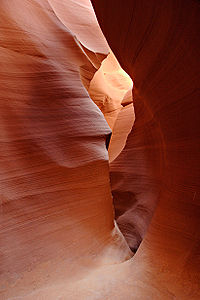Sandstone


Sandstone is a sedimentary rock. It is a rock made of compacted sand. Sand is small grains of rocks and minerals (such as quartz and feldspar). These are the most common minerals in the Earth's crust.
Sandstone which is resistant to weathering is used for building in many countries. It can be a hard rock. For example, paving slabs can be made out of hard sandstone.
Sandstone is converted into quartzite through heating and pressure. This happens when rocks are squeezed and heated under a mountain chain.[1]
Sandstone is most likely to be deposited from fast pacing water such as rivers.
Origin[change | change source]
Sandstone forms in two stages. First, layers of sand build up as sediment, either from water or from air (as in a desert).
Then sand particles are compacted by pressure of overlying deposits, and cemented ('glued' together).[2] The 'cement' is either calcite (calcium carbonate), quartz (silica), or clay. Iron oxide often makes sandstone a reddish color.
Related pages[change | change source]
- Old Red Sandstone was laid down in marine conditions. It is a sort of dirty dark red. Devonian period.
- New Red Sandstone was laid down in desert conditions. It is a rock which is fairly bright orange-red in color. Permian period.
Notes[change | change source]
- ↑ Metamorphic rock is formed by tectonic compression in orogenic belts.
- ↑ The geological word for this is 'cementation'.
